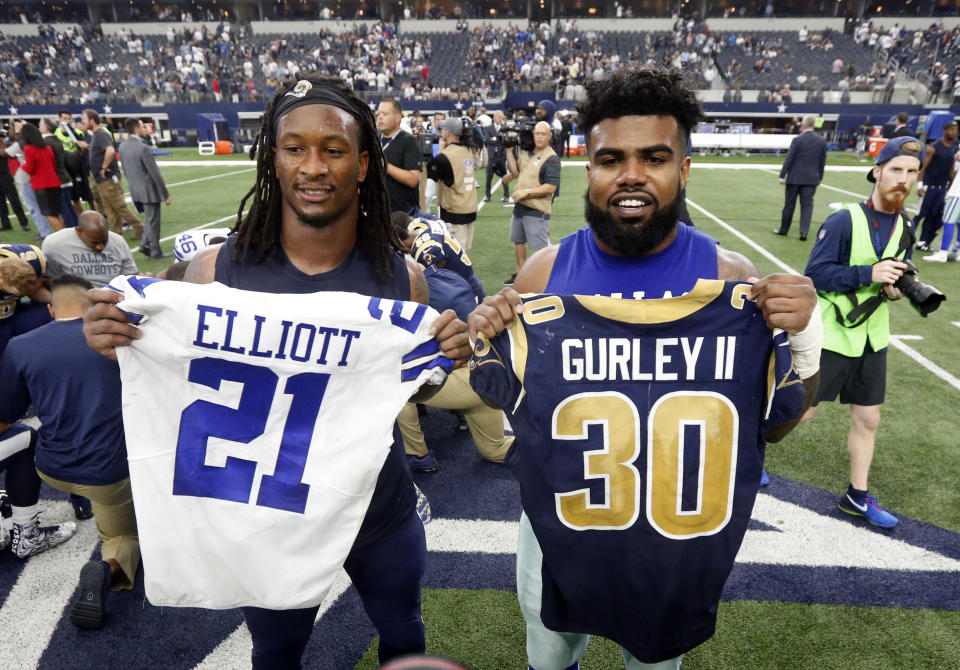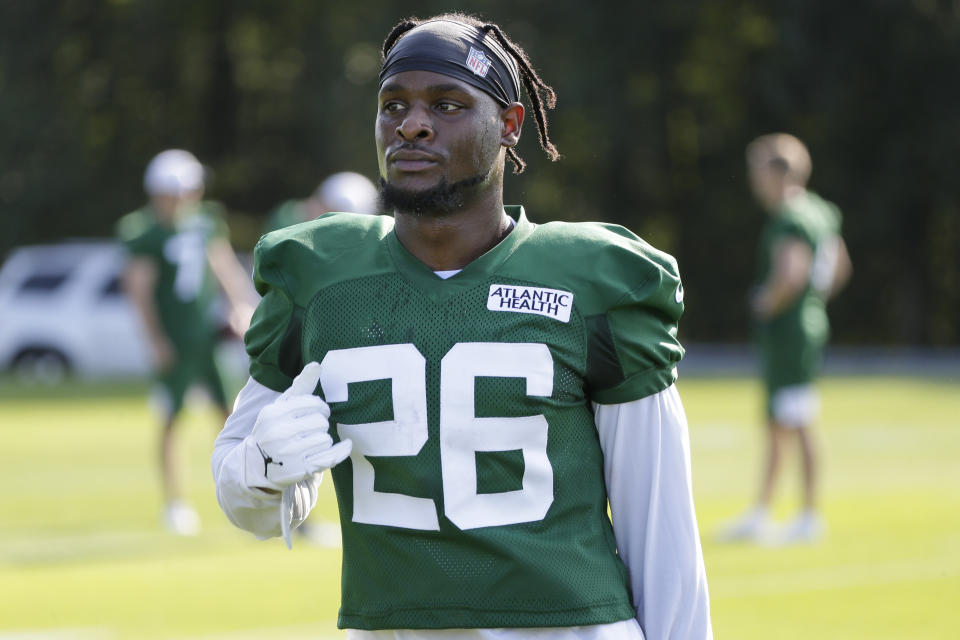Another star RB is complicating the Ezekiel Elliott holdout as teams look to draw line below $57.5M
OXNARD, Calif. – It’s business. It’s football. It’s the business of football. This is the company line for the Dallas Cowboys in the Ezekiel Elliott contract holdout.
Right now, nobody is saying much. Elliott’s camp is quiet. Cowboys ownership is measured. The players are unconcerned. And nobody is saying anything negative, which at this stage is probably the most important point for the franchise. But none of this means Elliott’s situation will be resolved easily. Not without one side making a financial concession.
Either the Cowboys are going to be willing to pay Elliott the Todd Gurley money that he wants, or Elliott is going to be willing to take less than the highest-paid running back in the league. In most cases, that’s a simple equation. But this isn’t most cases. And it has less to do with Elliott than the other guy, whose deal is weighing heavily on seemingly every upper-end running back negotiation.
Specifically, Todd Gurley and his sizable contract extension. The one that aged poorly for the Los Angeles Rams last season and has been the bane of essentially every franchise with a Pro Bowl-level running back.

Frowns over Todd Gurley’s $57.5 million deal
“Teams with running backs hate that Gurley deal. It’s in their heads,” one veteran contract adviser said of Gurley’s four-year $57.5 million extension, which was reached with the Rams on the eve of training camp in 2018. “Now other franchises are trying to get it under control and roll [the salaries] back.”
Another adviser with experience doing top-end running back deals was specific about what “rolling it back” means. The adviser suggested that agents are facing the same thing over and over: NFL front offices want to use Devonta Freeman’s 2017 extension with the Atlanta Falcons as a baseline that pulls back on the Gurley deal.
“With good running backs, teams are trying to make the thought process something along the lines of negotiating off Freeman’s [$8.25 million per year] salary,” he said. “And if it’s a great running back, teams want that premium in the $12 million neighborhood or even less – not building off of Todd’s [$14.375 million] per-year average.”
“It comes down to whether some teams believe the Rams did a bad deal with Todd,” the contract adviser said. “Then it’s whether you have the [guts] to say, ‘We’re not even going to consider that a real bar in these [negotiations].’”
The Gurley deal has already negatively impacted at least one negotiation – Le’Veon Bell’s failed talks with the Pittsburgh Steelers – and may also be creating some lingering issues with the Melvin Gordon extension impasse with the Los Angeles Chargers. Sources who spoke to Yahoo Sports pinned the Chargers and Gordon being nearly $3 million apart on their annual salary expectations, with the Chargers falling in line near $10 million per season and Gordon’s negotiation starting near the $13 million annual salary of Arizona Cardinals running back David Johnson.
Lowering ceiling for ‘unicorn backs’
How does Gurley factor into that Gordon negotiation? In theory, Gurley’s deal slots Johnson as the next tier in running backs. Which means “unicorn” backs like Gurley are $14 million to $15 million per-season players, while the next echelon of backs like Johnson (and in theory, Gordon), should fall into the $13 million range.
The problem? Bell was also considered a “unicorn back.” And he faced a cold free-agent market before signing a somewhat controversial deal with the New York Jets that averages $13.125 million per season. A deal that landed after the Jets appeared to be ultimately negotiating against themselves.

According to contract advisers who have been circling running back deals over the past 12 months, it is apparent that the deals of guys like Gurley, Bell and even Johnson isn’t the kind of math teams are interested in engaging in. While franchises appear to have grudgingly accepted Odell Beckham Jr.’s $18 million annual salary (and the impact it has had on wideouts) as a barometer for the market, teams have been less accepting of Gurley’s deal as being a bellwether for running backs.
The rationale for why that is has been a subject of debate, but it likely has roots in every-down running backs becoming less of a bedrock in offensive schemes, as well as injury realities at the position. Not to mention that Gurley’s deal could look staggeringly bad if last season’s worries about his knee health persist this year.
This looms large for Elliott on a number of fronts. First, he’s angling for a contract that exceeds the Gurley deal, which is hard for Dallas to grapple with because the Gurley deal looks like a bad one. Second, Dallas has a quarterback in Dak Prescott who is going to be near the top of the quarterback heap, along with a wideout in Amari Cooper who should land in the top three in his position when his deal is done.
Considering the money already invested in the offensive line, that makes Dallas overwhelmingly salary cap-heavy on offense in the next few seasons. That is a problem because there are some additional defensive deals that should be sizable, including linebacker Jaylon Smith and cornerback Byron Jones.
Cowboys tight end Jason Witten probably summed it up best on Saturday, when he called Elliott’s holdout “tricky” for the player and franchise.
“It’s really hard,” Witten said. “I’ve seen it over the course of my career. I thought what Jerry [Jones] said and Stephen [Jones] and how they approach it … these things happen. You go through them and hope it gets worked out soon.”
That may very well happen in the coming days. But however this gets resolved, it will have ramifications. Either Elliott will land a Gurley deal and help harden the salary floor for “elite” running backs, or he’ll take less and play a part in what NFL teams seem to want: A dialing back of the upper end of the running back scale.
And that’s a big factor in why this deal simply isn’t easy for anyone.
More from Yahoo Sports:

